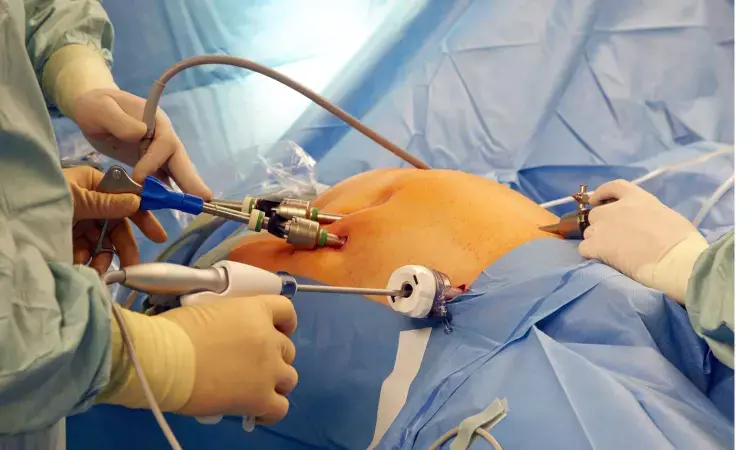- Home
- Medical news & Guidelines
- Anesthesiology
- Cardiology and CTVS
- Critical Care
- Dentistry
- Dermatology
- Diabetes and Endocrinology
- ENT
- Gastroenterology
- Medicine
- Nephrology
- Neurology
- Obstretics-Gynaecology
- Oncology
- Ophthalmology
- Orthopaedics
- Pediatrics-Neonatology
- Psychiatry
- Pulmonology
- Radiology
- Surgery
- Urology
- Laboratory Medicine
- Diet
- Nursing
- Paramedical
- Physiotherapy
- Health news
- Fact Check
- Bone Health Fact Check
- Brain Health Fact Check
- Cancer Related Fact Check
- Child Care Fact Check
- Dental and oral health fact check
- Diabetes and metabolic health fact check
- Diet and Nutrition Fact Check
- Eye and ENT Care Fact Check
- Fitness fact check
- Gut health fact check
- Heart health fact check
- Kidney health fact check
- Medical education fact check
- Men's health fact check
- Respiratory fact check
- Skin and hair care fact check
- Vaccine and Immunization fact check
- Women's health fact check
- AYUSH
- State News
- Andaman and Nicobar Islands
- Andhra Pradesh
- Arunachal Pradesh
- Assam
- Bihar
- Chandigarh
- Chattisgarh
- Dadra and Nagar Haveli
- Daman and Diu
- Delhi
- Goa
- Gujarat
- Haryana
- Himachal Pradesh
- Jammu & Kashmir
- Jharkhand
- Karnataka
- Kerala
- Ladakh
- Lakshadweep
- Madhya Pradesh
- Maharashtra
- Manipur
- Meghalaya
- Mizoram
- Nagaland
- Odisha
- Puducherry
- Punjab
- Rajasthan
- Sikkim
- Tamil Nadu
- Telangana
- Tripura
- Uttar Pradesh
- Uttrakhand
- West Bengal
- Medical Education
- Industry
Mesenteric defects closure during bariatric surgery reduces long-term risk for small bowel obstruction: JAMA

Sweden: The closure of mesenteric defects during laparoscopic Roux-en-Y gastric bypass (LRYGB) surgery reduces the long-term risk of small bowel obstruction (SBO), suggesting that routine use of this procedure should be considered during LRYGB; a recent study has shown.
The randomized clinical trial with a 2-arm, parallel design with ten years of follow-up that involved 2507 Swedish patients randomized to closure or nonclosure of mesenteric defects during LRYGB showed that closure of mesenteric defects reduced the incidence of reoperation for SBO from 14.9% to 7.8%. The study was published online in JAMA Surgery on May 10, 2023.
Short-term and mid-term data have shown that mesenteric defect closure during laparoscopic RGYB surgery reduces the risk of internal herniation with SBO but may raise the risk of kinking of the jejunojejunostomy in the early postoperative period. However, no clinical trials have reported long-term results from this intervention concerning the risk for small bowel obstruction or opioid use.
To fill this knowledge gap, Erik Stenberg, from Örebro University in Örebro, Sweden, and colleagues aimed to evaluate long-term efficacy and safety outcomes of closure of mesenteric defects during laparoscopic Roux-en-Y gastric bypass.
The RCT included patients with severe obesity scheduled for LRYGB bariatric surgery at 12 centres in Sweden from 2010 to 2011, with ten years of follow-up after the intervention. During the operation, 2507 patients (mean age, 41.7 years; 74.3% females) were randomly assigned in the ratio of 1:1 to the closure of mesenteric defects at the Petersen space and beneath the jejunojejunostomy using nonabsorbable running sutures (1259) or to nonclosure (1248).
The study's primary outcome was reoperation for small bowel obstruction. The new incident, chronic opioid use, as a measure of harm was a secondary endpoint.
The authors reported the following findings:
- After censoring for emigration and death, 1193 patients in the closure group and 1198 in the nonclosure group were followed up until the closure of the study.
- Over a median follow-up of 10 years, a reoperation for small bowel obstruction from day 31 to 10 years following surgery was performed in 185 patients with nonclosure (10-year cumulative incidence, 14.9%) and 98 patients with closure (10-year cumulative incidence, 7.8%) (sub hazard ratio [SHR], 0.42).
- New incident chronic opioid use was observed among 175 of 863 opioid-naive patients with nonclosure (10-year cumulative incidence, 20.4%) and 166 of 895 opioid-naive patients with closure (10-year cumulative incidence, 18.7%) (SHR, 0.90).
The secondary outcome of postoperative chronic opioid use did not reach statistical significance. "It is important to note that the 10-year cumulative incidence of intestinal obstruction requiring surgery in the treatment group was still almost 8%," I. Michael Leitman, Icahn School of Medicine at Mount Sinai, New York, New York, wrote in an invited commentary.
"In this trial, closure of mesenteric defects during LRYGB surgery effectively reduced the long-term risk for small bowel obstruction," the study authors concluded.
Reference:
Stenberg E, Ottosson J, Magnuson A, et al. Long-term Safety and Efficacy of Closure of Mesenteric Defects in Laparoscopic Gastric Bypass Surgery: A Randomized Clinical Trial. JAMA Surg. Published online May 10, 2023. doi:10.1001/jamasurg.2023.1042
Dr Kamal Kant Kohli-MBBS, DTCD- a chest specialist with more than 30 years of practice and a flair for writing clinical articles, Dr Kamal Kant Kohli joined Medical Dialogues as a Chief Editor of Medical News. Besides writing articles, as an editor, he proofreads and verifies all the medical content published on Medical Dialogues including those coming from journals, studies,medical conferences,guidelines etc. Email: drkohli@medicaldialogues.in. Contact no. 011-43720751


